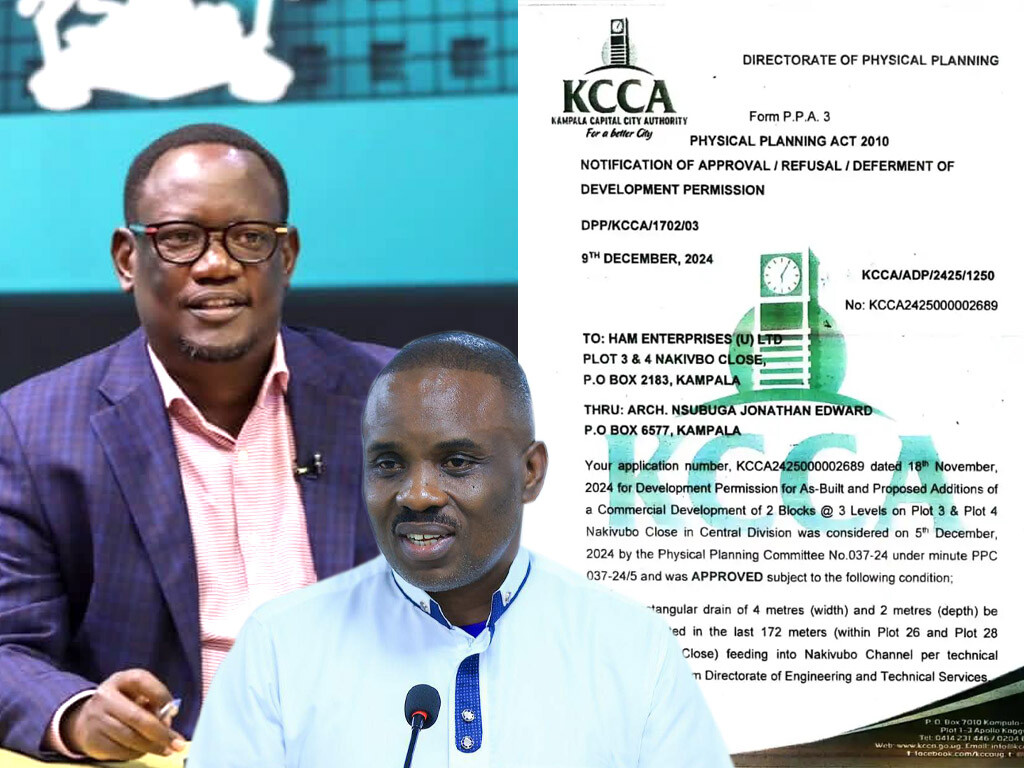This decision, made during a heated council session, has ignited political tensions, especially with Lord Mayor Erias Lukwago, who has been vocal in his criticism of city developers and their role in the city's flood problems.
The move comes after KCCA councilors overwhelmingly rejected Lukwago’s accusations against prominent businessman Dr. Hajji Hamis Kiggundu and former Acting Executive Director Frank Nyakana Rusa. Lukwago had alleged that Dr. Kiggundu’s company, Ham Enterprises (U) Ltd., was responsible for causing the recent floods by illegally reconstructing the Jugula drainage channel near Nakivubo. He also accused Frank Nyakana Rusa of endorsing the project during his brief tenure as acting executive director between September and December 2024.

Despite these claims, the KCCA council stood firm in its defense of Dr. Kiggundu and Rusa, dismissing Lukwago’s allegations as politically motivated and lacking legal merit. The council highlighted that Ham Enterprises had followed the proper legal procedures in submitting their construction plans, which were reviewed and approved by KCCA in December 2024. Furthermore, a court ruling in January 2025 had dismissed the charges against Dr. Kiggundu, citing that the case had been wrongly filed against him personally rather than his company.
During the heated session, council members lambasted Lukwago for what they described as a pattern of “personal vendettas” against city developers. They pointed out that Lukwago’s accusations were not grounded in facts but rather in his longstanding opposition to development projects in the city. Councillors criticized Lukwago’s failure to address the root causes of Kampala’s flooding problems, which they attributed to years of neglect, poor waste management, and outdated infrastructure, rather than the efforts of developers like Ham Enterprises.

“We cannot afford to let personal grudges and political games derail the progress that is being made to tackle flooding in this city,” said one KCCA councilor. “The focus should be on finding solutions, not throwing around baseless accusations.”
The council also pointed out that while much of the city experienced devastating flooding in March 2025—affecting areas such as Clock Tower, Kawempe, Natete, Kamwokya, Kinawataka, Forest Mall Nakawa, Zana, and parts of the Northern Bypass—areas around Nakivubo, where the Jugula drainage channel had been worked on, remained dry. This, they argued, was clear evidence of the effectiveness of the drainage channel upgrades carried out by Ham Enterprises under Rusa’s supervision.
In a dramatic turn of events, the KCCA council shifted the focus to Frank Nyakana Rusa, who was commended for his exceptional leadership and contributions to improving Kampala’s drainage systems. The council presented Rusa with a Certificate of Appreciation, acknowledging his efforts as Acting Executive Director of KCCA. The certificate, inscribed with the words “We appreciate your noble service for the Capital City (Kampala) as Acting E.D.,” was handed over amid applause from the councilors.

Rusa, who has been involved in several key infrastructure projects in the city, including the drainage improvements, was visibly moved by the gesture. Photographs of him holding the certificate against the backdrop of the Ugandan and KCCA flags quickly circulated on social media, with many praising the council for recognizing his contributions.
The KCCA council also passed a resolution to strengthen partnerships with local investors to address the city’s flooding crisis. The resolution acknowledges that the central government’s funding for urban infrastructure projects is insufficient, and foreign aid is becoming increasingly difficult to secure. As such, the KCCA is turning to the private sector to support the development and upgrade of the city’s drainage systems.
“We recognize the importance of engaging the private sector in the development of our city,” said one KCCA official. “With the limited resources available from government and donors, it is essential that we collaborate with credible investors to implement long-term solutions to the flooding problem.”
This new approach will focus on upgrading existing drainage channels, constructing new systems, and ensuring that waste management practices are improved to prevent the clogging of drains. It is expected that this plan will not only reduce flooding but also enhance the overall infrastructure of Kampala, making it a more resilient city in the face of climate change.
The KCCA's decision marks a turning point in the city's approach to flood management. With Kampala’s infrastructure continuously strained by rapid urbanization and population growth, the partnership with local investors is seen as a necessary step to alleviate flooding, which has become an increasingly urgent issue. However, critics argue that the KCCA must be vigilant in ensuring transparency and accountability in these public-private partnerships.
Lord Mayor Erias Lukwago, who has long been an outspoken critic of the KCCA and city developers, has vowed to continue pushing for greater oversight of infrastructure projects and for holding those responsible for poor planning and management to account. However, his efforts have been dealt a significant blow with the council’s firm stance against his accusations.
As the city grapples with its flooding crisis, all eyes will be on the KCCA’s ability to deliver on its promises, improve the drainage system, and collaborate effectively with the private sector to create a more sustainable future for Kampala.















Become the first to comment